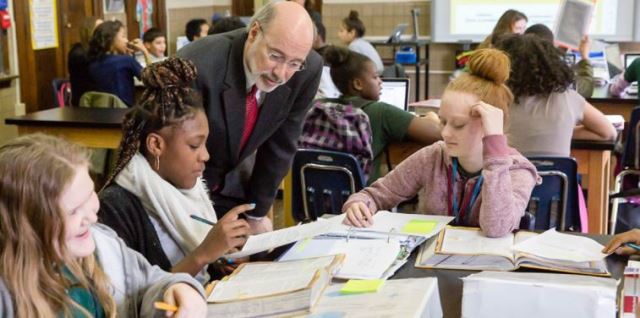 HARRISBURG – Gov. Tom Wolf joined Secretary of Education Pedro Rivera, advocates and educators on Monday to announce a significant reduction in standardized testing.
HARRISBURG – Gov. Tom Wolf joined Secretary of Education Pedro Rivera, advocates and educators on Monday to announce a significant reduction in standardized testing.
The change to the Pennsylvania System of School Assessment (PSSA) will reduce the length of the tests by 20 percent in grades three through eight.
“As I have traveled the commonwealth on the Schools That Teach tour, I have heard from parents, students and educators concerned about the amount of time devoted to taking standardized tests,” said Wolf during a ‘Schools That Teach’ tour stop at Susquehanna Middle School in Dauphin County.
“This reduction will ease the stress placed on our kids, and will allow students and teachers to focus more on learning than on testing. This change should also reassure parents that we’ve listened to their concerns about over-testing.”
The reduction in test time arose from discussions between the Department and stakeholders for nearly a year as it developed its Every Student Succeeds Act (ESSA) Consolidated State Plan.
Beginning this school year, students and teachers in grades 3 through 8 will spend an average of 20 percent less time on statewide testing, and an even greater reduction – nearly 25 percent – for Pennsylvania’s youngest students.
The Department has identified and removed two sections – one in math, one in English language arts – and additional questions from the science section, which could eliminate up to two full testing days for some schools.
The math assessment will be shortened by 48 minutes for students in grades 3 through 8 by removing a section of multiple choice questions.
The English Language Arts assessment will be shortened by 45 minutes and the Science assessment will be shortened by 22 minutes.
Additionally, the Wolf Administration worked with internal and external stakeholders to review the proposed changes and ensure the assessments retained their rigor, accuracy and alignment with Pennsylvania state standards.
Standardized tests are mandated under federal law, and can serve as important tools for schools to review their progress and achievement.
However, noting that standardized tests not only interrupt learning, but can also be disruptive for students, even those in non-testing grades, the department plans to continue to identify ways to further reduce those disruptions in coming years.
“Each year, teachers spend an inordinate amount of time preparing students to pass the PSSA. The current system has resulted in a loss of creativity and innovation within our classrooms and growing pressure for teachers to ‘teach to the test,’” said Dr. Tamara Willis, superintendent of Susquehanna Township School District.
“Shortening the PSSA will restore much needed instructional time and give teachers greater autonomy to address the needs and inspire the creativity of every learner.”
Wolf has fought for Schools That Teach and has made investments in children and schools a top priority.
Over the past three years, Pennsylvania has:
- Increased state funding by more than $800 million at all levels after devastating cuts in the past that is bringing teachers back to the classroom and restore educational program.
- Established a Fair funding formula to reduce the inequity in state support and taking Pennsylvania off a shameful list of states without a way to fairly fund their school. Pennsylvania was one of only three states in the nation without a fair funding formula.
- Doubled early childhood education access to provide nearly 8,800 more children access to Pre-K and Head Start programs to get a good start to their education.
- Increased graduation rates to among the highest in the nation for four-year high school from 85.5 percent in 2013-14 to 86.1 percent in 2015-16.
Additionally, 31 percent more students have earned industry-recognized credentials as Pennsylvania has become a national leader in STEM education, helping workers compete in the 21st century economy and build economic prosperity for working families.
Also this year, the department introduced the Future Ready PA Index, a new, public-facing school report card that expands the indicators used to measure performance, extends the comprehensive approach to ensuring student and school success.
The index will place additional emphasis on academic growth, evaluation of school climate through a robust chronic absenteeism measure, attention to both four-year and extended-year graduation rates, and assessments of postsecondary readiness.
Details about the PSSA reduction and the Future Ready PA Index are available in Pennsylvania’s ESSA Consolidated State Plan, on PDE’s Web site. The plan is open for public comment until Aug. 31, 2017.


